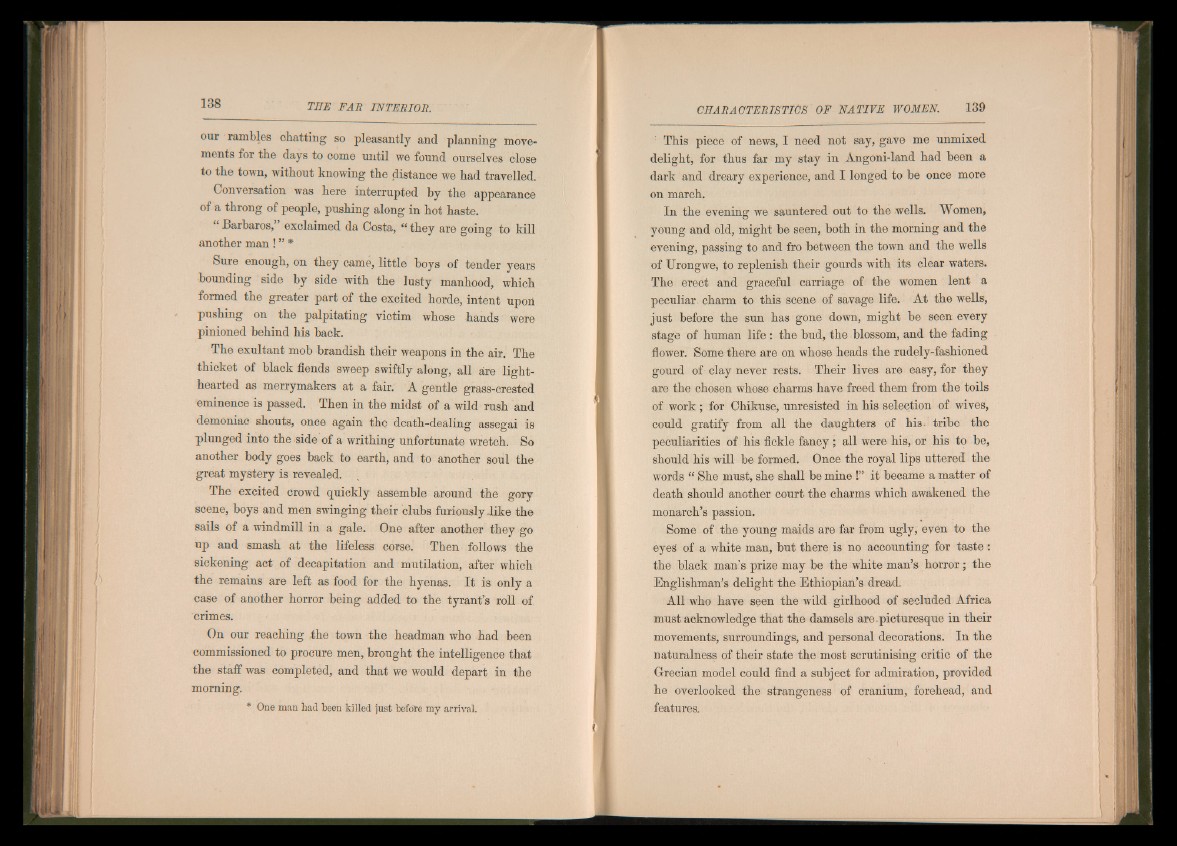
our rambles chatting so pleasantly and planning movements
for the days to come until we found ourselves close
to the town, without knowing the (iistance we had travelled.
Conversation was here interrupted by the appearance
of a throng of people, pushing along in hot haste.
Barbaros, exclaimed da Costa, iC they are going to kill
another man ! ” *
Sure enough, on they came, little boys of tender years
bounding side by side with the lusty manhood, which
formed the greater part of the excited horde, intent upon
pushing on the palpitating victim whose hands were
pinioned behind his back.
The exultant mob brandish their weapons in the air. The
thicket of black fiends sweep swiftly along, all are lighthearted
as merrymakers at a fair. A gentle grass-crested
eminence is passed. Then in the midst of a wild rush and
demoniac shouts, once again the death-dealing assegai is
plunged into the side of a writhing unfortunate wretch. So
another body goes back to earth, and to another soul the
great mystery is revealed.
The excited crowd quickly assemble around the gory
scene, boys and men swinging their clubs furiously dike the
sails of a windmill in a gale. One after another they go
up and smash at the lifeless corse. Then follows the
sickening act of decapitation and mutilation, after which
the remains are left as food for the hyenas. I t is only a
case of another horror being added to the tyrant’s roll of
crimes.
On our reaching the town the headman who had been
commissioned to procure men, brought the intelligence that
the staff was completed, and that we would depart in the
morning.
* One man had been killed just before my arrival.
This piece of news, I need not say, gave me unmixed
delight, for thus far my stay in Angoni-land had been a
dark and dreary experience, and I longed to be once more
on march.
In the evening we sauntered out to the wells. Women,
young and old, might be seen, both in the morning and the
evening, passing to and fro between the town and the wells
of Urongwe, to replenish their gourds with its clear waters.
The erect and graceful carriage of the women lent a
peculiar, charm to this scene of savage life. At the wells,
just before the sun has gone down, might be seen every
stage of human life : the bud, the blossom, and the fading
flower. Some there are on whose heads the rudely-fashioned
gourd of clay never rests. Their lives are easy, for they
are the chosen whose charms have freed them from the toils
of work ; for Chikuse, unresisted in his selection of wives,
could gratify from all the daughters of his. tribe the
peculiarities of his fickle fancy ; all were his, or his to be,
should his will be formed. Once the royal lips uttered the
words “ She must, she shall be mine !” it became a matter of
death should another court the charms which awakened the
monarch’s passion.
Some of the young maids are far from ugly, even to the
eyeS of a white man, but there is no accounting for taste :
the black man's prize may be the white man’s horror; the
Englishman’s delight the Ethiopian’s dread.
All who have seen the wild girlhood of secluded Africa
must acknowledge that the damsels are . picturesque in their
movements, surroundings, and personal decorations. In the
naturalness of their state the most scrutinising critic of the
Grecian model could find a subject for admiration, provided
he overlooked the strangeness of cranium, forehead, and
features.